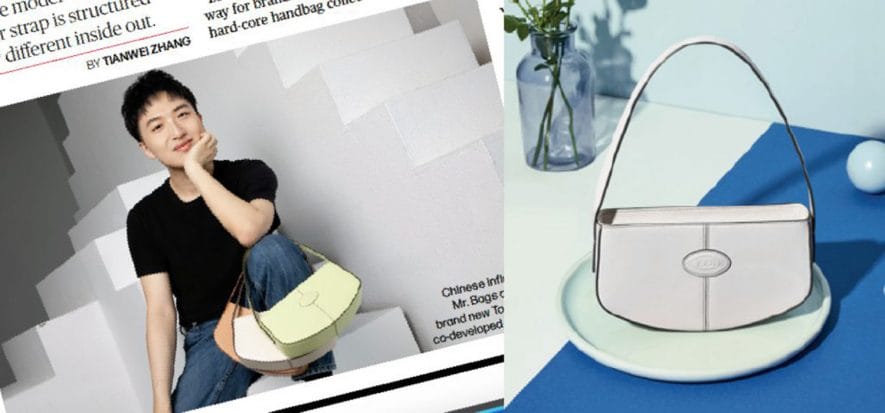Luxury brands that want to break into the Chinese market need influencers. But not because customers of the People’s Republic respond, as if by automatism, to their buying advice. But because influencers represent real bridges, cultural and authoritative, between Western brands and Chinese public opinion. Adrian Cheng, tycoon at the head of a group with 13 billion euros in revenues, explains this to L’Economia – Il Corriere della Sera. He is the head of Chow Tai Fook jewellery chain, tenth in the world, while with financial New World Development he has interests in retail and real estate.
Influencers are needed
Every now and then you come across news, like the one at the end of August about the collaboration between Mr. Bags and Tod’s (in the photo), on the sales successes of influencers. They seem exotic curiosities, but they tell of market dynamics. Sticking to the example in question, it can be seen that Mr. Bags (stage name of Tao Liang, in the photo) played a dual role: before recommending the purchase of the bag, he curated it with Casette d’Ete designers its development in a way that appealed to the customers of the People’s Republic. It is not a coincidence, but a sign of the times.
The Chinese market does its own thing
“Western luxury brands are still doing well at the moment – explains Cheng -. But we are noticing the new Heritage Hip trend, inspired by ancient Chinese styles as well as the Han dynasty”. The phenomenon could push the public to change their purchasing orientation: “It will be very difficult for international brands to translate these codes and adapt – goes on Cheng -. This is also why I think there will be a huge demand for homemade luxury brands that can truly capture the rise of Chinese national pride”.
The cultural bridge
Furthermore, coronavirus has hit the trend. “The pandemic is likely to have accelerated the transition of international luxury brands to domestic brands”. Western brands are called upon to respond quickly: “They need to get in touch with Chinese customers, treat them and grow with them – he argues -. They cannot simply apply the same formula to China as the United States or Europe. Sometimes young consumers trust influencers more than brands themselves, because they connect with them on multiple levels”.
Acting as a media company
Speaking of connecting on multiple levels, Cheng is very clear: to win in China you need strategies that are more elaborate than usual marketing. His group has also moved in this direction. “During the months in which Covid had forced people to stay at home – is his story – we changed our strategy on social networks. We’ve partnered with influencers to launch new online campaigns, and invited world-class creatives to join our webinars to inspire millennials. We did art and culture shows”. The verdict, therefore, is one: “In the future, every brand will also have to think of itself as a media company – he concludes -: content is no longer exclusive to publishing”.
Read also:










